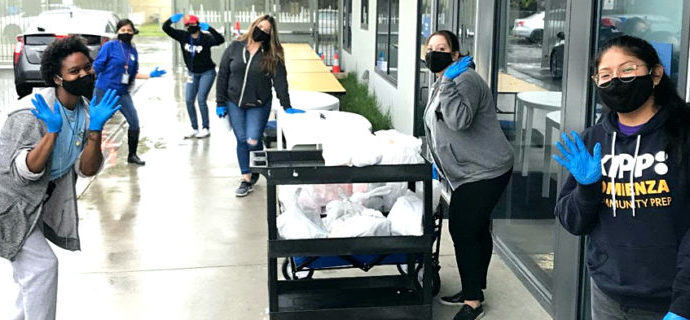KIPP Schools’ Response to COVID-19 Went Way Beyond Academics
ByRichard Barth
You often hear that a crisis usually brings out the best in people, and it was certainly the case at KIPP Schools around the country. I am certain countless other schools have a similar story to tell.
Our response from the start recognized that continued learning required us to meet essential human needs.
All of our schools experienced early on that COVID-19 exacerbated the equity issues that our students, families and educators who are Black and Latinx already face.
They are facing illness and loss of loved ones at higher rates, unemployment, food insecurity and lack of adequate health care. This has a direct effect on the ways our community, most importantly, our students (and teachers) will continue to interact with our schools and with each other. Our response from the start recognized that continued learning required us to meet essential human needs.
As COVID-19 was looming and school closures became a possibility, our teams set up operations to make sure that our more than 100,000 students, 90% of whom are from low-income families, would continue to have access to food. Since the beginning of the pandemic, we have served over 700,000 meals.
Our teams also responded to the challenge of providing remote learning. In North Carolina, where we have schools in rural Halifax and Gaston, we sent our busses out on a 93-mile ride to deliver instructional packets, knowing that at least half of our students don’t have access to Wi-Fi. From California to Texas to NY and Massachusetts, we worked overtime to do all we could to address the digital divide. We delivered over 40,000 Chromebooks to our families and thousands of Wi-Fi hot spots.
WE REACHED OUT TO OUR ALUMNI
The KIPP Alumni Emergency Fund was created within days of colleges announcing they were closing their doors because of COVID-19. We raised close to $150,000 with the sole focus on ensuring our alumni in college have what they need to stay in school and achieve their post-secondary goals. We have awarded over 530 grants to KIPP alumni across the country for food assistance, technology, transportation, housing and lost wages.
We had cases where homeless alumni were left to fend for themselves when college doors shuttered and left without a source of food when their cafeterias closed. We had students who did not have enough money to get home, and others for whom the loss of on-campus jobs or part-time jobs was devastating because it was the only source of income for their own daily expenses, and for many their families’ as well.
WE REACHED OUT TO OUR FAMILIES AND OUR COMMUNITIES
Our regions also made sure to take care of KIPP families and the community around them. They rushed to create emergency funds to help our families weather hard economic times. In Columbus, our schools partnered with Kroger to give families $50,000 worth in gift cards for groceries. In NY, our high school runs a food bank for the community where they have been able to give out thousands of pounds of food and household items such as dish sets, gloves and boots to the community.
Our staff in New Orleans, Massachusetts and New York gathered gear from science classes to donate to local hospitals to help our first responders deal with the onslaught of patients from the virus. Teachers at KIPP Central City Academy in New Orleans are volunteering their time to make personal protective equipment (PPE) for medical personnel fighting COVID-19. In partnership with Delgado Fab Lab, these teacher-makers are cranking out hundreds of 3D-printed face shields, masks, ventilator splitters and more.
Read the full article here
